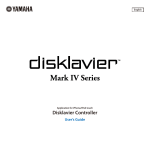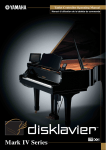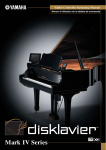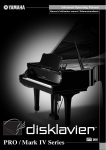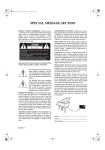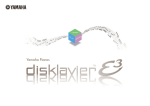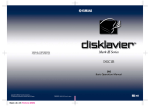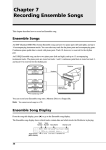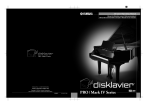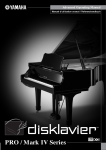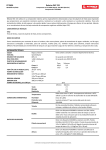Download Yamaha DKC-850 User`s guide
Transcript
English Application for iPhone/iPod touch/iPad Disklavier Controller User’s Guide Disklavier Mark IV Series Disklavier E3 Disklavier Control Unit DKC-850 Introduction Thank you for downloading the Disklavier Controller! This exciting application allows you to control many of the basic functions of your Disklavier Mark IV, Disklavier E3 or Disklavier Control Unit DKC-850. Please read this guide before operating this application. Compatible devices (as of September 1, 2010) This application is compatible with the following Apple products (iOS 3.0 or later is required). • iPhone • iPod touch • iPad Requirements • The firmware of your Disklavier must be as follows. Refer to the Disklavier operating manual and update the firmware. - For Disklavier Mark IV : Version 4.00 or later - For Disklavier E3 : Version 3.00 or later - For Disklavier Control Unit DKC-850 : Version 3.10 or later • Your iPhone/iPod touch/iPad must be connected to the Disklavier through a wireless router. Wireless router Wireless LAN iPhone/iPod touch/iPad LAN cable Disklavier Introduction ii Table of Contents Chapter 1 Getting Started 2 3 4 5 6 7 8 Screen Menu Structure Starting the Application Searching for a Piano Connecting to a Piano Entering Your Passcode Putting the Disklavier in Standby Mode Reactivating from Standby Mode Chapter 2 Song Playback 10 Selecting a Song 13 Operation during Playback Chapter 3 DisklavierRadio Playback 16 Selecting a Channel 18 Operation during DisklavierRadio Playback Chapter 4 Recording Songs 20 Starting Recording 21 Stopping Recording 22 Titling a Song Chapter 5 Other Functions 24 25 26 27 28 Adjusting Sound Source Volume Balance Transposing Songs Changing Song Tempo Cancelling Parts Using Shortcuts Chapter 6 Related Information 30 Notes on the Passcode Setting 31 Troubleshooting 32 Trademarks and Copyrights Table of Contents iii 1 Getting Started Introduction 1 Screen Menu Structure The following is an approximate representation of the screen menus. Start application Opening When a connection has previously been established When first started Passcode* [Piano Search] Piano Search [Standby] Standby Mode Main (horizontal) Authentication Change device orientation Main (vertical) Top [Select] [Balance] [More] Album Source/Media Song Balance More [Record] Record [Play Function] [Short Cut] Play Function Short Cut * This screen appears when connecting to a piano with the passcode set. Chapter 1 Getting Started 2 Starting the Application Tap on the application icon. The opening screen appears. When you have previously connected to a piano: The application connects to that piano automatically. Operation during playback (page 13) When connecting to a piano for the first time: The application searches for a piano. Searching for a piano (page 4) Chapter 1 Getting Started 3 Searching for a Piano When connecting to a piano for the first time, you must first find the piano to which you want to connect. Tap on [Piano Search]. Language switch Switches the language displayed in this screen between English and Japanese. [Piano Search] Starts searching for pianos. Once the search is complete, select the piano to which you want to connect. Connecting to a piano (page 5) Chapter 1 Getting Started 4 Connecting to a Piano A list of pianos the application found appears. Select from the list the piano to which you wish to connect. Tap on the piano you wish to connect to. Piano list [Demo Mode]* Switches to the demonstration mode, in which you can check the operations on the Disklavier Controller even when no pianos are found. * Operations in demonstration mode are the same as those when connected to the Disklavier Mark IV. After completion, perform passcode authentication if required. Entering your passcode (page 6) Setting the passcode (page 30) Otherwise, start song playback. Operation during playback (page 13) Chapter 1 Getting Started 5 Entering Your Passcode After connection is complete, carry out authentication by entering your 4-digit passcode. Enter the passcode you set on the Disklavier. Enter 4-digit passcode and tap on [OK]. Passcode entry field [Cancel] Returns to piano search. [OK] Begins passcode authentication. Numeric keys Chapter 1 Getting Started 6 Putting the Disklavier in Standby Mode Tap on [More] in the toolbar, then on [Standby] in the More screen that appears. To reactivate your Disklavier… Reactivating from Standby Mode (page 8) Chapter 1 Getting Started 7 Reactivating from Standby Mode Use the following screen to reactivate your Disklavier from Standby mode. Slide the switch to the right. Switch Reactivates your Disklavier from Standby mode. Chapter 1 Getting Started 8 2 Song Playback Introduction 9 Selecting a Song Tap on [Select] in the toolbar. Tap on the desired source/media. Source list Media list Next, select an album. Selecting an album (page 11) Chapter 2 Song Playback 10 Selecting a Song (continued) Tap on the desired album. [Source] Returns to source selection. Album list [Media] Returns to media selection. Album list Next, select a song. Selecting a song (page 12) Chapter 2 Song Playback 11 Selecting a Song (continued) Tap on the desired song. [Album] Returns to album selection. Song list [Album] Returns to album selection. Song list* *Displaying the list may take time if there are many songs. The selected song is played back. Operation during playback (page 13) Chapter 2 Song Playback 12 Operation during Playback Tapping on the screen during song playback shows the song control panel for various operations.* Display of the song control panel cycles on and off every time you tap on the screen. Tap on the screen during playback. Song title [ ] (skip / fast forward) Skips to the next song when tapped briefly (less than one second). Fast-forwards through the current song when tapped for a longer period (at least 1 second). [ ] (play / pause) Starts or pauses playback. Song position Displays the playback position. ] (skip back / rewind) [ Skips to the previous song when tapped briefly (less than one second). Rewinds through the current song when tapped for a longer period (at least one second). *Operations in this application may not always take effect on your Disklavier immediately. Chapter 2 Song Playback 13 Operation during Playback (continued) Tap on the screen during playback. Repeat mode Cycles through the repeat mode. : Repeat off : Single repeat mode : All repeat mode : Random repeat mode Main volume Adjusts the main volume. Quiet status*1 Cycles through the quiet status. : Acoustic mode : Quiet mode : Headphone mode*2 *1 You cannot change quiet status when connected to some models of the Disklavier E3 and Disklavier Control Unit DKC-850. *2 For Disklavier E3 upright pianos and Disklavier Control Unit DKC-850, this does not appear. For Disklavier E3 grand pianos and Disklavier Mark IV, the quiet status is locked to Headphone mode when you connect headphones. Chapter 2 Song Playback 14 3 DisklavierRadio Playback Introduction 15 Selecting a Channel Tap on [Select] in the toolbar. Tap on [DisklavierRadio] or [D-Radio]. [Disklavier Radio] [D-Radio] Next, select a channel. Selecting a channel (page 17) Chapter 3 DisklavierRadio Playback 16 Selecting a Channel (continued) Tap on the desired channel. [Source] Returns to source selection. Channel list* *To select channels other than the two complimentary channels, you must first log into the Internet Direct Connection (IDC) service on the Disklavier. [Media] Returns to media selection. Channel list* *To select channels other than the two complimentary channels, you must first log into the Internet Direct Connection (IDC) service on the Disklavier. The selected channel is played back. Operation during playback (page 18) Chapter 3 DisklavierRadio Playback 17 Operation during DisklavierRadio Playback Tapping on the screen during DisklavierRadio playback shows the song control panel for various operations.*1 Display of the song control panel cycles on and off every time you tap on the screen. Tap on the screen during playback. Channel title / song title [Mute Off] / [Mute On] Cycles the mute function on and off. Main volume Adjusts the main volume. [Back] Returns to channel selection. Quiet status*2 Cycles through the quiet status. : Acoustic mode : Quiet mode : Headphone mode*3 *1Operations in this application may not always take effect on your Disklavier immediately. *2You cannot change quiet status when connected to some models of the Disklavier E3 and Disklavier Control Unit DKC-850. *3For Disklavier E3 upright pianos and Disklavier Control Unit DKC-850, this does not appear. For Disklavier E3 grand pianos and Disklavier Mark IV, the quiet status is locked to Headphone mode when you connect headphones. Chapter 3 DisklavierRadio Playback 18 4 Recording Songs Introduction 19 Starting Recording Tap on [More] in the toolbar, then on [Record] in the More screen that appears. Tap on [Rec Start] and play the Disklavier. Counter [Rec Start] Starts recording. [Cancel] Cancels recording. Recording will start by playing the Disklavier, and the counter starts to advance. Stopping recording (page 21) Chapter 4 Recording Songs 20 Stopping Recording Tap on [Stop]. [Stop] Stops recording. Next, title the song you have just recorded. Titling the recorded song (page 22) Chapter 4 Recording Songs 21 Titling a Song After recording the song, you can add a title to that song. We recommend entering titles in alphanumeric characters. Non-alphanumeric characters in titles may not be displayed correctly on your Disklavier. Enter a title to the recorded song and tap on [OK]. Title entry field [Cancel] Cancels the title entry. [OK] Confirms the title entered. Keyboard Chapter 4 Recording Songs 22 5 Other Functions Introduction 23 Adjusting Sound Source Volume Balance Tap on [Balance] in the toolbar. Use the slider to adjust the volume for each sound source. [Voice] Adjusts the volume of the piano part. [TG] Adjusts the volume of the ensemble part from the internal tone generator. [Audio] Adjusts the volume of software (audio CD, etc). [Mic] Adjusts the microphone level. [Voice] Adjusts the volume of the piano part. [TG] Adjusts the volume of the ensemble part from the internal tone generator. [Audio] Adjusts the volume of software (audio CD, etc). Chapter 5 Other Functions 24 Transposing Songs Tap on [More] in the toolbar, then on [Play Function] in the More screen that appears. Use [Transpose ] / [Transpose ] to transpose. [Transpose ] / [Transpose ] Adjusts the key in half steps, 24 half-steps lower or higher (i.e. 2 octaves in either direction). Chapter 5 Other Functions 25 Changing Song Tempo Tap on [More] in the toolbar, then on [Play Function] in the More screen that appears. Use the slider to adjust the tempo. [Tempo] Adjusts the tempo over the following range: Disklavier Mark IV: -50% to +20% Disklavier E3: -50% to +50% [Reset] Returns to the default tempo (0%). Chapter 5 Other Functions 26 Cancelling Parts Tap on [More] in the toolbar, then on [Play Function] in the More screen that appears. Use [Part Cancel] to switch parts on and off. [Part Cancel] Switches the left (L) or right (R) parts on and off. Chapter 5 Other Functions 27 Using Shortcuts Tap on [More] in the toolbar, then on [Short Cut] in the More screen that appears. Tap on the desired shortcut. Shortcut list* *Shortcuts can only be assigned, edited or deleted on the Disklavier. Chapter 5 Other Functions 28 6 Related Information Introduction 29 Notes on the Passcode Setting To prevent others from controlling your Disklavier with the Disklavier Controller, you can set the passcode on your Disklavier. Default setting No passcode is set as default, which means any Disklavier Controller can control your Disklavier. How to set the passcode The passcode can be set in the passcode setting screen of your Disklavier. For Disklavier Mark IV users: You can access this screen by tapping , then on . Refer on to the Advanced Operating Manual for more information. For Disklavier E3 and Disklavier Control Unit DKC-850 users: You can access this screen by pressing [SETUP] on the remote control, then selecting “Passcode.” Refer to the Operation Manual for more information. Set the 4-digit number as the passcode. You can control your Disklavier with the Disklavier Controller by entering the passcode set in this screen (see page 6). Forgot passcode? Delete or reset the passcode in the screen above. Chapter 6 Related Information 30 Troubleshooting If you have problems operating the Disklavier, see if any of the symptoms listed below apply to your problem and follow the recommended remedy. The Disklavier Controller does not function at all. ♫♫ Your iPhone/iPod touch/iPad and the Disklavier may not be connected in a wireless environment. Make sure that your iPhone/iPod touch/iPad is connected to a WiFi access point that is on the same network as your Disklavier for this application to function. ♫♫ The firmware of your Disklavier must be as follows. Check the version of firmware you are using and update the firmware if necessary. - For Disklavier Mark IV : Version 4.00 or later - For Disklavier E3 : Version 3.00 or later - For Disklavier Control Unit DKC-850 : Version 3.10 or later You cannot find or connect to the desired piano. ♫♫ You may be using the iPhone/iPod touch/iPad too far from the wireless router to which your Disklavier is connected. Make sure that your iPhone/iPod touch/iPad is within the specified communication range. The Disklavier Controller does not respond even when you tap on the buttons. ♫♫ Restart your iPhone/iPod touch/iPad. ♫♫ Uninstall the Disklavier Controller from your iPhone/iPod touch/iPad, and then reinstall it. Chapter 6 Related Information 31 Trademarks and Copyrights • Yamaha and Disklavier are trademarks of Yamaha Corporation. • Apple, iPhone, and iPod touch are trademarks of Apple Inc., registered in the U.S. and other countries. iPad is a trademark of Apple Inc. Chapter 6 Related Information 32 P.O.Box 1, Hamamatsu, 430-8650 Japan Copyright © 2011 by Yamaha Corporation Jul-11




































